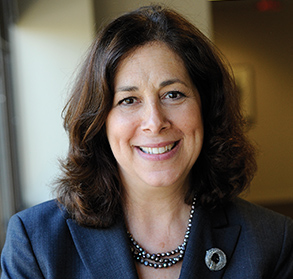09/21/2018
Personal Reasons Motivate Donations to Specific Charities
- Share This Story
Article reprinted with permission from Cleveland Jewish News.
By Becky Raspe
Giving money from an estate is a personal choice.
According to Terry Davis, CEO of Our Lady of the Wayside in Avon; Joel Fox, chief development officer at the Menorah Park Foundation in Beachwood; and Carol F. Wolf, assistant vice president of planned giving and endowment of the Jewish Federation of Cleveland in Beachwood; selecting where to donate to is as personal.
Davis said a good place to begin would be by doing research.

Wolf
“Any good organization has done a nice job on the PR side to have a lot of information out there,” Davis said. “But, any donor that is looking to make a major gift should check out the financial aspect of any nonprofit before they commit.”
Fox said, “The internet makes it a different universe than it was 20 years ago. So many opportunities didn’t exist before the internet. It is matching up the needs with the capacity to support those needs. That is magic.”
Wolf said planned gifts take more thought than one-time gifts.

Davis
“You may want to give to an organization to which you have been giving annually,” she said. “Choosing which one is difficult, but the way to do it is to think about what you care about most and then whom you trust. Whom do you have a history with? Making a planned gift to a new organization is risky. One that has history and proven outcomes will most likely exist for years to come and be able to honor your wishes for your gift.”
Many times a gift requires a personal connection between the organization and the donor, Fox said.

Fox
“It is very unusual for people to suddenly make a decision to give to something they’ve never given to before,” he said. “It does happen, but it’s unusual. Most donors spend a lifetime involved in something or being touched by something in their lifetime. They make the decision (to give) because they’re comfortable the particular organization is going to use the money effectively.”
To attract gifts, Davis said organizations look to donor interests.
“The cause always matters,” he said. “If there is a particular cause we know a donor is interested in, we look into how that could fit into our particular program. And if we don’t have anything up front, we look into general support. But most donors have a passion for something.”
Wolf said being involved or having relationships at organizations helps ease the choice. But if that isn’t the case, donors or their advisors should reach out to a development officer or CEO and meet with them in person.
“Ask the hard questions about how planned gifts are used and invested, and don’t feel like you have to make the decision at the first meeting,” she said.
Even if a donor is sure they’ve found the right organization, uncertainty isn’t uncommon.
“For donors, especially if they are giving what we call major gifts, it is very important for them to find out where their money is going and what it might be used for,” Davis said. “Those support dollars are very crucial for nonprofits and any good nonprofit would be happy to sit down and discuss that.”
Fox said, “It is about the information that one has gleaned, gathered or been told about an organization and it is about your level of comfort with the people who are going to be utilizing your funds. It’s all about relationships.”
But once a donor finds the organization they wish to give to, Wolf said, “it should just feel right.”
“It’s a gut feeling, but should also be based on facts,” Wolf said. “Making a commitment of an asset that is not to be used until after your death, requires trust. If you can, establish that trusting relationship with the organization while you’re alive and make your wishes for your gift known. Then, you have to have faith that the organization will honor those wishes.”

